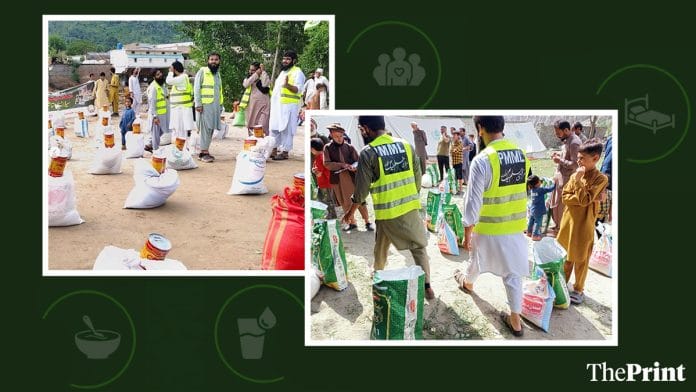New Delhi: Large groups of Lashkar-e-Taiba (LeT) personnel are heading into flood-affected regions of Pakistan’s Khyber-Pakhtunkhwa and Punjab, carrying relief materials for families displaced by this week’s severe flooding.
The Lashkar’s relief effort, Indian intelligence officials told ThePrint, is the largest made by the organisation since the 2005 Kashmir earthquake, which saw it rise as a significant political force in the region.
The fund-collection efforts and organisational work is taking place under the banner of the Markazi Milli Muslim League, banned in both India and the United States as a front-organisation of the Lashkar-e-Taiba.
Video posted on social media shows large convoys carrying supplies including 20-kg bags of flour and 5-kg packets for ghee for flood victims in Buner and Mingora. Footage has also been posted showing Lashkar volunteers evacuating seriously unwell people by carrying them on ‘charpais’ (bedsteads) down mountain paths.
According to the US Treasury Department, the seven key leaders of the Markazi Milli Muslim League—Saifullah Khalid, Muzammil Iqbal Hashimi, Muhammad Harris Dar, Tabish Qayyum, Fayyaz Ahmad, Faisal Nadeem, and Muhammad Ehsan—are all former members of the Lashkar, and continue to act on its behalf.
The Zarb-e-Azb Facebook page, which reproduces Lashkar propaganda, reported on a firefight which took place in early August between Indian troops and terrorists hiding in the forests above Kulgam, in southern Kashmir. In one post, the site claimed —falsely—that more than a dozen Indian soldiers had been killed in fighting, but remained in control of the ridgeline that dominates the area.
Earlier, the Facebook page claimed that Indian officials were seeking to negotiate an end to the fighting in Kulgam
Like it did before Pakistan was placed on a grey list of nation-states without adequate provisions to combat terrorism finance in 2018, the Lashkar had again begun advertising its extensive networks of charitable hospitals and ambulance services.
These activities are paid for, in substantial part, by collecting the hides of animals sacrificed during Eid, which are then sold to leather-manufacturers. Last summer, for example, the Lashkar set up centres to collect sacrificial animals at several centres across Islamabad
Even though authorities banned the collection of hides by 10 charitable front-organisations linked to the Jamaat-ud-Dawa, the Pakistan Markazi Muslim League was inexplicably not among them.
From the income, the Lashkar has created significant new infrastructure, including a modern thalassaemia hospital in Kasur, outside Lahore. The inherited blood disorder, linked to cultural practices involving first-cousin marriages, has imposed crippling economic and social burdens on many communities in Punjab and Mirpur.
The Lashkar has long used charitable operations as a means to gain influence for its sectarian practices and ideological beliefs in communities where it has not been represented. The Falah-i-Insaniat Foundation, which was shut down in 2019, often operated closely with authorities, with its volunteers even helping to rescue children during the 2014 terrorist attack on the Army Public School in Peshawar.
Along with relief work, the foundation was active in Lashkar mobilisations within Pakistan, including a water movement claiming India was denying the country its share of the Indus, and an anti-blasphemy movement.
Following the grey-listing of Pakistan, authorities had taken over swathes of Lashkar-run social infrastructure, including mosques, seminaries, schools and hospitals. Those facilities are now being again run by the Milli Muslim League, an Indian intelligence source familiar with the issue told ThePrint.
(Edited by Tony Rai)
Also Read: After nuke threat from Tampa, Asim Munir’s Brussels rant on being ‘God’s choice to protect Pakistan’






